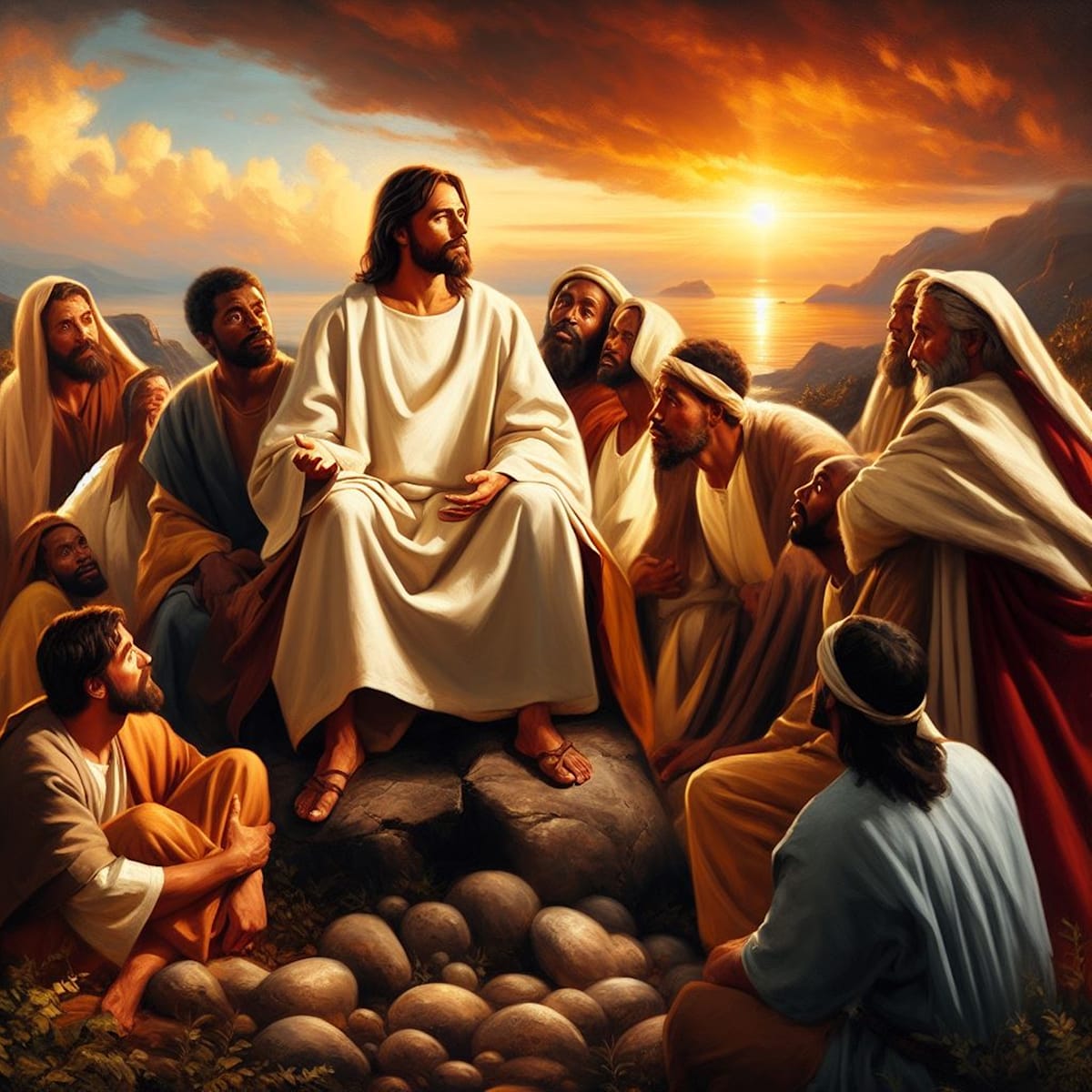Note: This article contains an excerpt (at the end) from my book A Catholic Prays Scripture (Volume 2): concerning the sacraments.
My wife and I go to different churches. I go to St. Wenceslaus Catholic Church; she goes to Lifegate, which per their website is “an interdenominational church, which means that people from all faith backgrounds (or no faith background) are welcome!” I would describe my church as religious; Lifegate’s website claims that their church is not “religious” because “following Jesus should be authentic, practical ...”.
Our situation is not ideal, but we make the best of it; no one has had to compromise their beliefs. From time to time, we attend each other’s services. My wife’s Sunday church service is built around a lively “praise and worship” and a well-crafted teaching. They typically hold a communion service once a month. My church service is built around “adoration” (e.g., Glory to God, Holy, Holy, Holy ...), several readings from the Bible, a brief homily on those readings, and the sacrament of the Eucharist.
The “Takeaway” Question
It is not unusual for my wife to inquire of me after church, “How was church; what was your takeaway.” Over the years, I have struggled with her question. Because of a variety of reasons, I don’t always come away from church with an easily stated takeaway. Since she continues to ask the question, I am trying harder to come up with better answers, but it has not been easy.
The question is usually aimed at the priest’s relatively brief homily on the readings (i.e., how was church) and what I got out of it (i.e., my takeaway). In my defense, my ability to understand the homilies is hampered by my poor hearing, crying babies, and screaming toddlers; and not all homilies are well-crafted. My biggest problem, however, is my inattentiveness (my wandering mind). In any case, I now try to concentrate enough to come away with some kind of answer to her question.
It has recently dawned on me that the answer to my wife’s question is easy, and I can use it every week. My answer going forward will be. “The priest changed bread and water to the body and blood of Jesus. I was able to partake in this sacrament. My takeaway – I should always go forth from the Mass to love and serve the Lord.” Not everybody has that experience on Sunday. Many do not eat the body and blood of Jesus.
The Bread of Life Discourse (John 6:22-59)
My “easy” answer is very difficult for the modern ear to understand. It has always been difficult to understand, as noted in the gospel of John.
While the problem started during Jesus’ earthly ministry as he spoke, the problem was magnified (for you and me) when Saint Paul, in his first letter to the Corinthians (11:23-24, NAB) wrote: “For I received from the Lord what I also handed on to you, that the Lord Jesus, on the night he was handed over, took bread, and after he had given thanks, broke it and said, "This is my body that is for you. Do THIS in remembrance of me” (my bold and my CAPs). What did “THIS” mean?
The problem continued in the synoptic gospels of Mark (14:22), Matthew (26:26) and Luke (22:19). The latter reads: “Then he took the bread, said the blessing, broke it, and gave it to them, saying, "This is my body, which will be given for you; do THIS in memory of me” (again my bold and my CAPs).
The Gospel of John, while it devotes four chapters (13-17) to the Passover supper (e.g., washing of the disciples' feet, announcement of Juda's betrayal, the coming of the Advocate), does not contain any verses on the nature of the bread eaten at the Last Supper.
John’s “eucharistic” theology was not presented at the time of the Last Supper. It was presented earlier on a hillside near the Sea of Galilee, as Jesus spoke to his disciples and some Jews from Tiberias, in what is often referred to as “The Bread of Life Discourse” (John 6:22-59). That “discourse” provides some beautiful and complementary verses on the bread eaten at the Last Supper.
In John 6:48, Jesus states that he was “the bread of life.” He further stated (John 6:55): “For my flesh is true food, and my blood is true drink.” He uses the “flesh” word four other times, and it bothers those listening. They began to murmur and depart. I encourage you to read and reread John 6:22-59 and “The Words of Eternal Life” that follow (John 6:60-71).
Getting back to Saint Paul’s message in 1 Corinthians 11: 23-24, what exactly was this THIS that Jesus stated? We don't have far to look. In the prior sentence Saint Paul tells us that Jesus "took bread" and said "this is my body that is for you." This is what Jesus wanted the apostles to do on his behalf, nothing more and nothing less. That is what is reaffirmed in the sixth chapter of John.
Transubstantiation
The Catholic Church has a long and often misunderstood theological word to describe how bread and wine are changed into the body and blood of Jesus. That word, transubstantiation, which goes back to the Council of Trent (1546-1563) involves two of the Church’s sacraments: Holy Orders (e.g., ordaining priests) and the Eucharist itself.
While we Catholics (more to follow) believe that the bread and wine are changed to the Body and Blood of Christ during the sacrament of the Eucharist, we also note that what we eat and drink still tastes like bread and wine. There is nothing in the Gospel accounts to suggest that the bread and wine that Jesus offered to the apostles tasted like anything besides bread and wine either. At the same time, we believe that something "special" and "sacred" happened during the Last Supper.
CCC 1376: "The Council of Trent summarizes the Catholic faith by declaring: 'Because Christ our Redeemer said that it was truly his body that he was offering under the species of bread, it has always been the conviction of the Church of God, and this holy Council now declares again, that by the consecration of the bread and wine there takes place a change of the whole substance of the bread into the substance of the body of Christ our Lord and of the whole substance of the wine into the substance of his blood. This change the holy Catholic Church has fittingly and properly called transubstantiation.' "
That’s it; I will add little more. I will not wade any further into this theological forest. Much has been written about transubstantiation, if you wish to pursue this topic any further.
I will note, however, that the above is still hard for many to believe, just as it was when Jesus first spoke about eating his flesh. It is so difficult to believe that it has fractured Christianity. It is so difficult to believe that, per a 2019 Pew Research Center survey, a mere 31 percent of U.S. Catholics believe it. This finding so alarmed the Church that a three-year National Eucharistic Revival was established. Time will tell if the revival, which was recently concluded, has changed the thinking of those in the pews.
For the record, I am among the 31 percent noted above. I believe what the Church teaches regarding the sacrament of the Eucharist. Since I believe what the Church teaches on this matter, why would I want to worship anywhere else?
Our Daily Super-Essential Bread
Most Christians are familiar with The Lords Prayer, which was derived from the Bible (Matthew 6:9-14, Luke 11:1-4) – the prayer verse (“Give us this day our daily bread") and biblical verses ("Give us today our daily bread" and "Give us each day our daily bread").
The Church (cf. CCC 2837) notes that: "daily" (epiousios) occurs nowhere else in the New Testament. Taken literally (epi-ousios: "super-essential"), it refers directly to the Bread of Life, the Body of Christ, the "medicine of immortality," without which we have no life within us.
Another way of thinking about the above passage from The Lord's Prayer thus becomes: "Give us this day our super-essential bread."
The Church (CCC 2837, emphasis added) continues: "Finally in this connection, its heavenly meaning is evident: 'this day' is the Day of the Lord, the day of the feast of the kingdom, anticipated in the Eucharist that is already the foretaste of the kingdom to come. For this reason it is fitting for the Eucharistic liturgy to be celebrated each day. The Eucharist is our daily bread."
The Catholic Church takes the words spoken by Jesus during the Last Supper and in the sixth chapter of John seriously, so seriously that those words became the basis for one of the seven sacraments of the Church. The Catholic Church takes the words of Jesus so seriously, that the sacrament of the Eucharist, the Mass, is celebrated not just every Sunday, but "daily" and all over the world. It is safe to say that a Mass is being celebrated somewhere every hour that we live. This is in sharp contrast to how often other Christian denominations "memorialize" Jesus' words. The Eucharist is our super-essential bread.
An Excerpt from A Catholic Prays Scripture (Volume 2)
While reading John 6, I noted that Jesus recognized that his sayings were "hard" and shocking to some – but Jesus never backed down. He apparently took his words seriously.
Note that John 6:61 does NOT conclude with Jesus saying:
· "You do not understand. Come back!"
· "I have confused you. Come back!"
· "You have taken me too seriously. Come back!"
· "I was just kidding." Come back!"
He saw that his words divided his disciples. He saw that his words caused many of his disciples to leave – but Jesus never backed down. I suspect that Jesus was very sad – but Jesus never backed down. Jesus apparently took his words seriously.
The Church (CCC 1338) notes, “Will you also go away?: the Lord’s question echoes through the ages, as a loving invitation to discover that only he has ‘the words of eternal life’ and that to receive in faith the gift of his Eucharist is to receive the Lord himself.”
How seriously should we take the Lord’s “hard” words?
The first photo was AI-generated and obtained from pixaby.com. It reminded me of John 6:24-27 (Jesus speaking to the crowd at Capernaum).
The photograph above was taken by me on Friday, February 3, 2017, when I took a wonderful boat ride on the Sea of Galilee. The city of Tiberias is in the background.
Note: The use of CCC above refers to the Catechism of the Catholic Church (copyright 1994) and the associated paragraph numbers of the material quoted. The biblical citations were taken from the 1994-95 edition of the New American Bible (NAB).

